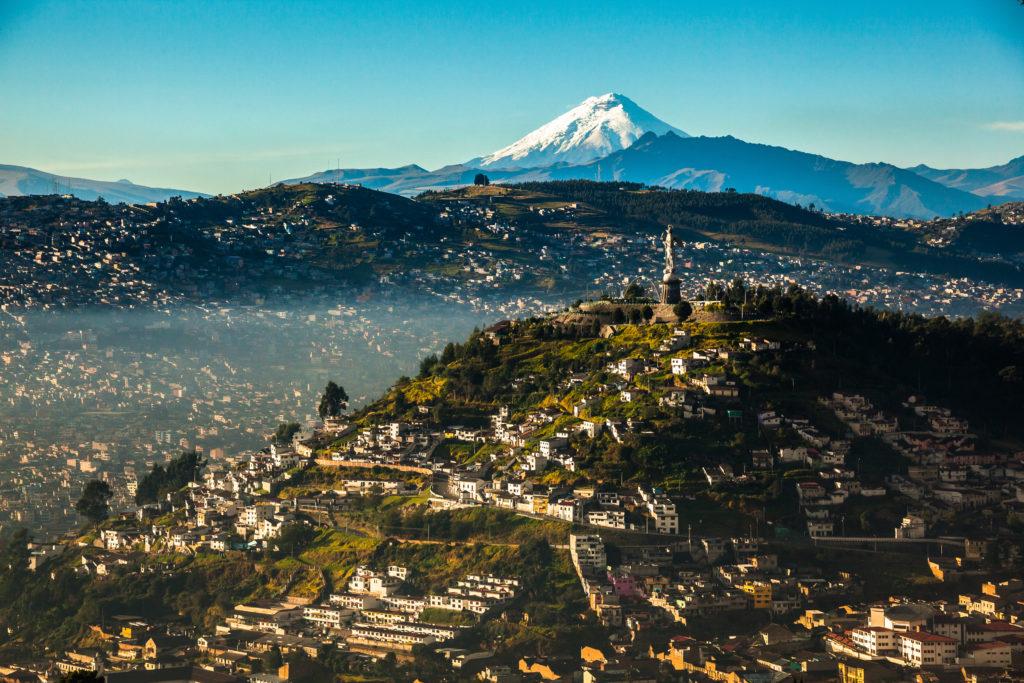Reuters | July 31, 2023

View of El Panecillo in the center of Quito with the Cotopaxi in the background. Stock image.
Ecuadoreans will decide in two August referendums whether oil and mining projects in key regions of the country can continue, weighing Indigenous and environmental concerns against billions in potential lost income.

The South American country could lose about 12% of its 480,000-barrel-per-day (bpd) crude oil output if voters approve shuttering the 43-ITT block in the megadiverse Yasuni nature reserve in the Amazon, while a local referendum in Quito would bar mining in the Choco Andino forest, scuppering six gold concessions.
Environmental activists and communities near the sites say the bans are necessary to protect nature, fight climate change and, in the case of the Yasuni vote, safeguard some Indigenous Waorani people who are voluntarily isolated.
But oil and mining guilds say their industries are needed to shore up Ecuador’s battered economy and that bans would expose the areas to illegal mining and deforestation.
Outgoing President Guillermo Lasso, who moved ahead elections after lawmakers attempted to oust him, has failed to raise oil production or attract more mining investment as violence and social problems have worsened.
A “yes” vote in both referendums could complicate finances for his successor.
“We want to keep our territory safe and healthy. They say when they take crude they bring health, education, but we don’t see anything, there’s no development,” Ene Nenquimo, a national Waorani leader, told Reuters during a visit to Yasuni communities. “The government, from its desk, just sees trees. … But we live here.”
A single hectare (2.5 acres) of the Yasuni has 650 species of trees, more than the whole of North America, as well as hundreds of species of birds, mammals, reptiles and fish, according to the environment ministry.
Voters seem to be leaning toward yes votes in both referendums, said Santiago Pérez, head of pollster Clima Social, who has conducted surveys for his clients.
“I think as the population gets better informed and learns more about Yasuni and the Choco Andino that will favor the yes options,” he said.
State oil company Petroecuador says a “yes” on the Yasuni referendum would cost the country $13.8 billion in income over the next two decades.
Platforms in the ITT have up to 39 wells each to minimize the space they occupy, Petroecuador head Ramon Correa told journalists in mid-July.
“The park has had the best protection practices,” Correa said.
Two other Petroecuador blocks in the area would be unaffected by the vote.
Income versus environment
Former President Rafael Correa authorized the ITT fields after an unsuccessful effort to raise funds from the international community in exchange for barring development.
Despite improving technology and care, oil development in the Yasuni has hurt the environment and is threatening residents, including those who are voluntarily isolated, said Pedro Bermeo of advocacy group Yasunidos, which has been pushing for the referendum for a decade.
“They told us there wouldn’t be roads, that there wouldn’t be electricity generation, nor flares, and there is a huge impact,” Bermeo said.
Suspension of eventual full production in the ITT block would avoid the emission of 400 tonnes of carbon dioxide, says Yasunidos, though the group did not provide a time frame for the figure.
Petroecuador says there are no flares at the block, that it occupies 0.01% of the reserve’s 1 million hectares (2.5 million acres) and that roads are environmentally-friendly.
Meanwhile, opposition to mining is blocking some $1 billion in potential investment for the next two years, says Ecuador’s Chamber of Mining, though a major project by Australia’s SolGold is moving ahead.
Mining was Ecuador’s fourth-largest source of income last year, behind sales of oil, bananas and shrimp, bringing in $2.8 billion.
“It’s not moral that we stop an industry which could create many opportunities over untrue fears,” said Maria Eulalia Silva, the Chamber’s president, adding that barring legal production is unlikely to stop animal trafficking, illegal mining or illicit logging.
But residents say mining will threaten high altitude wetlands, water and animals like the spectacled bear.
“Mining will create water pollution, exploitation of the earth and destruction,” said Morelia Fuentes, a resident of a small agricultural community inside the forest. “We are fighting to have a healthy life.”
(By Alexandra Valencia, Tito Correa, Karen Toro and Julia Symmes Cobb; Editing by Marguerita Choy)
No comments:
Post a Comment